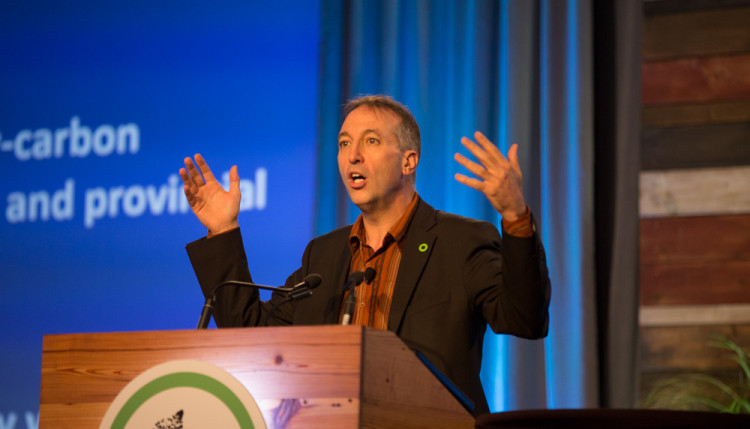
«If we do nothing, we accelerate the changes»
| In Toronto, Canada | He is a professor of physics and one of the most recognized researchers in energy of Canada. Ensures that it is possible to migrate to renewable energy systems and says that investment in oil is a very bad bet for the future. Fracking, climate change and the cost of inaction.
«We cannot manage the economy if we do not think first on climate change». Without hesitation, confident and assertive, Dr. Normand Mousseau was pronounced days ago in front of more than 700 people in the city of Toronto, Canada, under the Climate Reality Project Training led by former US Vice President Al Gore. From his point of view, this environmental phenomenon represents the most important sociopolitical challenge of the XXI century and should be at the forefront of the concerns of all stakeholders, both businessmen, as governments and citizens.
Professor of physics at the University of Montreal and one of the most recognized researchers in energy of Canada, Mousseau recognizes the enormous responsibility that the energy sector has on global warming, but is hopeful about the future of renewable energy. With the strength of the figures and scientific arguments, he helps us to understand a little more why the change is not only climate, but also implies (or rather should) involve a change of action of all humanity.
What is the actual situation of energy around the world?
Energy around the world is responsible for about 2/3 of all the greenhouse gases emissions made by humans, so it really addresses global warming. You cannot avoid looking at energy and transforming the way we are using energy, and the type of energy we are using today.
How we transform this energy system into a renewable one?
Today about 80% of all the energy that is being used on the planet is from fossil fuels, which means oil, coal and natural gas. The transformation needs essentially to displace this 80% of all the energy we are using to renewable and low carbon emissions sources. This is a huge challenge, but at the same time I could say that what we have seen over the last years makes it possible to hope over there. And that is the remarkable thing. Why? An example, a coal plant burns three tons of coal to produce one ton of energy in terms of electricity. So, there is a lot of energy that is lost. But if you replace this by using a windmill, all the energy used to make the windmill rotate results in electricity. So it is 100% efficient. That is how we can make this change possible.
During this process, what are the main challenges we need to deal?
There are two aspects regarding power generation today. For example, wind energy is cheaper than any new plant you can make for coal or natural gas. It’s cheaper today and that is amazing in comparison with other past years! Solar energy is still more expensive but it’s going to down very rapidly. The problem is that we are talking about intermittent energies, which means that when there is no wind, when there is no sun, we have no energy. So what do you do at night or in the winter? This real challenge that was not seen five years ago is storage: how we will store the electricity to deliver it when we need it.
For transportation the challenge is different because transportation is 100% fossil fuels. The challenge is to change totally the way we use transportation. It’s not sufficient to say electrify all the cars and the trucks on the road. Here technology information is changing the world so much that we don’t see it coming.
What is the actual reality of energy in Canada?
In Canada, it’s pretty good in some way. If you include nuclear as a low carbon energy, essentially 26% of the energy used in Canada is renewable, which is more than Germany for example. If you look at electricity, it’s 75% of all the electricity used in Canada which is renewable or low carbon emissions. This is ahead of almost everybody else on the planet. In some way, we should be at the front of the moving, because moving from 75% to 100% is much easier than moving from 20%. We should be there and moving rapidly. But we are not moving. And we have a lot of advantages. If we look at the renewable energy availability in Canada (wind, solar, hydropower) we have enough to answer more than two or three times our needs. And I’m talking only about the high quality.
Do you believe that the government of Canada takes climate change and environment as an important political agenda issue?
It depends. At the provincial level, you have a few provinces that they are doing things, which includes Quebec, which is part of a low carbon market with California; that includes British Columbia, which put a tax on emissions of CO2; and now includes Ontario, that is part of the low carbon market with Quebec and California. The problem is at the federal level. At the national level, the government is totally opposed to do anything against climate change and for limiting greenhouse gasses emissions. In part, there are still some of people on government that “refuse to acknowledge the importance of global warming”. This is unbelievable! But this still dominates the federal level. And you have the others that say “this will happen no longer so I don’t care about it”. So that is blocking a lot of the evolution that should take place in Canada.
In Argentina we are discussing about fracking and you have published a book about this theme. What is your opinion about the environmental impact of this activity?
What we know is that it takes water. It’s not “the disaster” that some people say, but the problem is that it occupies a lot of land, it needs a lot of water and it would leave in the place wells that will be there for hundreds of years. Even, you have ¾ of the gas in the place that will slowly pass over the years. This is the problem. There is also a second part, which I think is unmissed today. Oil prices are fallen almost by a half over the last years because we have oversupply. If the rest of the planet moves and decreases its use of carbon, essentially this means that producing more of them will not make us richer. If you are producer of petrol or gas and nobody ask for it, how much will you charge for it? So what is really interesting is that investing in oil and decide that your all economy will be built on extracting more and more oil and gas and coal, it’s in fact a very bad bet over the next 10 or 20 years. This should be worrying the people decision and investors.
You are also part of the media world, you have a radio show. How do you think we must communicate about climate change?
There are two points. The first thing is that science is very clear today: there is global warming, and it’s in large part because of human activities. That’s it. Second: the change will be happen whether we wanted it or not. The planet in 20 years will not be the same as today and the economy will not be the same as today. So what do we want to do? We want just to get blind and imagine that the world will stay like it is today, and not make the investment to prepare us and then get poor every day as we refuse to it? Or move ahead of the floor to be part of the winners? It’s just as simple as that. Global warming is taking place. If we do not anything, we accelerate the changes. These changes have an enormous cost. We are facing them and we will pay for them. We can change. In fact, we change all the time. Look what you have around you, your cellphone, your air conditioning, your car. This is not what you have 20 years ago. What can you say will be the next 20 years? Where would you be? Changes are taking place. So what we have to do is to orient these changes, so that at the end we live in a better world, where we have a higher quality of life and health. We have to move. The positive news today is about moving ahead of climate change and that every time you decide not to do it, you are getting poor and you are going in the direction that it would be more and more difficult. I think this is what we have to communicate as message. Not scare people. We have to say that the road we are proposing is in fact the only reasonable road to make our life better. Do you want a better life or not?
More about Dr. Normand Mousseau
– He is professor of Physics at the Université de Montréal and post-doctorate at the University of Oxford.
– Researcher renowned worldwide, he has published more than 150 scientific articles in specialized media on topics of biophysics and complex materials.
– He has written several books about the future of oil, energy independence in Quebec, the shale-gas and mining resources.
– Since September 2011, he produces and hots the popular radio program on science La Grande Équation at Radio VM.
| Article published at Gestión Sustentable, newspaper La Razón (in Spanish) |
